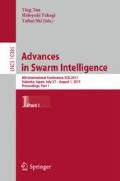Abstract
The pickup and delivery problem (PDP) is relevant to many real-world problems, e.g., logistic and transportation problems. The problem is to find the shortest route to gain commodities from the pickup nodes and supply them to the delivery nodes. The amount of commodities of pickup nodes and delivery nodes is usually assumed to be in equilibrium; thus, all pickup nodes have to be visited for collecting all commodities required. However, some real-world applications, such as rental bikes and wholesaling business, need only to gain sufficient commodities from certain pickup nodes. A variant of PDP, namely the selective pickup and delivery problem (SPDP), is formulated to address the above scenarios. The major difference of SPDP from PDP lies in the requirement of visiting all pickup nodes. The SPDP relaxes this requirement to achieve more efficient transportation. The goal of the SPDP is to seek the shortest path that satisfies the load constraint to supply the commodities demanded by all delivery nodes with some pickup nodes. This study proposes a max-min ant system (MMAS) to solve the SPDP. The ants aim to construct the shortest route for the SPDP considering the number of selected pickup nodes and all delivery nodes. This study conducts experiments to examine the performance of the proposed MMAS, in comparison with genetic algorithm and memetic algorithm. The experimental results validate the effectiveness and efficiency of the proposed MMAS in route length and convergence speed for the SPDP.
Access this chapter
Tax calculation will be finalised at checkout
Purchases are for personal use only
References
Parragh, S., Doerner, K., Hartl, R.: A survey on pickup and delivery problems. Part I: Transportation between customers and depot. J. für Betriebswirtschaft 58, 21–51 (2008)
Parragh, S., Doerner, K., Hartl, R.: A survey on pickup and delivery problems. Part II: Transportation between pickup and delivery locations. J. für Betriebswirtschaft 58, 81–117 (2008)
Savelsbergh, M., Sol, M.: The general pickup and delivery problem. Trans. Sci. 29(1), 17–29 (1995)
Berbeglia, G., Cordeau, J., Gribkovskaia, I., Laporte, G.: Static pickup and delivery problems: a classification scheme and survey. Top 15(1), 1–31 (2007)
Ting, C.K., Liao, X.L.: The selective pickup and delivery problem: formulation and a memetic algorithm. Int. J. Prod. Econ. 141(1), 199–211 (2013)
Stützle, T., Hoos, H.: The max-min ant system and local search for combinatorial optimization problems. In: Voß, S., Martello, S., Osman, I.H., Roucairol, C. (eds.) Meta-heuristics, pp. 313–329. Springer, Heidelberg (1999)
Stützle, T., Hoos, H.: Max-min ant system. Future Gener. Comput. Syst. 16(8), 889–914 (2000)
Liao, X.L., Ting, C.K.: An evolutionary approach for the selective pickup and delivery problem. In: Proceedings of the IEEE Congress on Evolutionary Computation, pp. 1–8 (2010)
Liao, X.L., Ting, C.K.: Evolutionary algorithms using adaptive mutation for the selective pickup and delivery problem. In: Proceedings of the IEEE Congress on Evolutionary Computation, pp. 1–8 (2012)
Pérez Cáceres, L., López-Ibáñez, M., Stützle, T.: Ant colony optimization on a budget of 1000. In: Dorigo, M., Birattari, M., Garnier, S., Hamann, H., Montes de Oca, M., Solnon, C., Stützle, T. (eds.) ANTS 2014. LNCS, vol. 8667, pp. 50–61. Springer, Cham (2014). doi:10.1007/978-3-319-09952-1_5
Dorigo, M., Birattari, M., Stützle, T.: Ant colony optimization. IEEE Comput. Intell. Mag. 1(4), 28–39 (2006)
Dorigo, M., Blum, C.: Ant colony optimization theory: a survey. Theoret. Comput. Sci. 344(2–3), 243–278 (2005)
Maur, M.: Adaptive ant colony optimization for the traveling salesman problem. Master’s thesis. Technical University of Darmstadt (2009)
Mou, L., Dai, X.: A novel ant colony system for solving the one-commodity traveling salesman problem with selective pickup and delivery. In: Proceedings of the International Conference on Natural Computation, pp. 1096–1101 (2012)
Liao, X.L., Ting, C.K.: Solving the biobjective selective pickup and delivery problem with memetic algorithm. In: Proceedings of the IEEE Workshop on Computational Intelligence in Production and Logistics Systems, pp. 107–114 (2013)
Author information
Authors and Affiliations
Corresponding author
Editor information
Editors and Affiliations
Rights and permissions
Copyright information
© 2017 Springer International Publishing AG
About this paper
Cite this paper
Liaw, RT., Chang, YW., Ting, CK. (2017). Solving the Selective Pickup and Delivery Problem Using Max-Min Ant System. In: Tan, Y., Takagi, H., Shi, Y. (eds) Advances in Swarm Intelligence. ICSI 2017. Lecture Notes in Computer Science(), vol 10385. Springer, Cham. https://doi.org/10.1007/978-3-319-61824-1_32
Download citation
DOI: https://doi.org/10.1007/978-3-319-61824-1_32
Published:
Publisher Name: Springer, Cham
Print ISBN: 978-3-319-61823-4
Online ISBN: 978-3-319-61824-1
eBook Packages: Computer ScienceComputer Science (R0)

